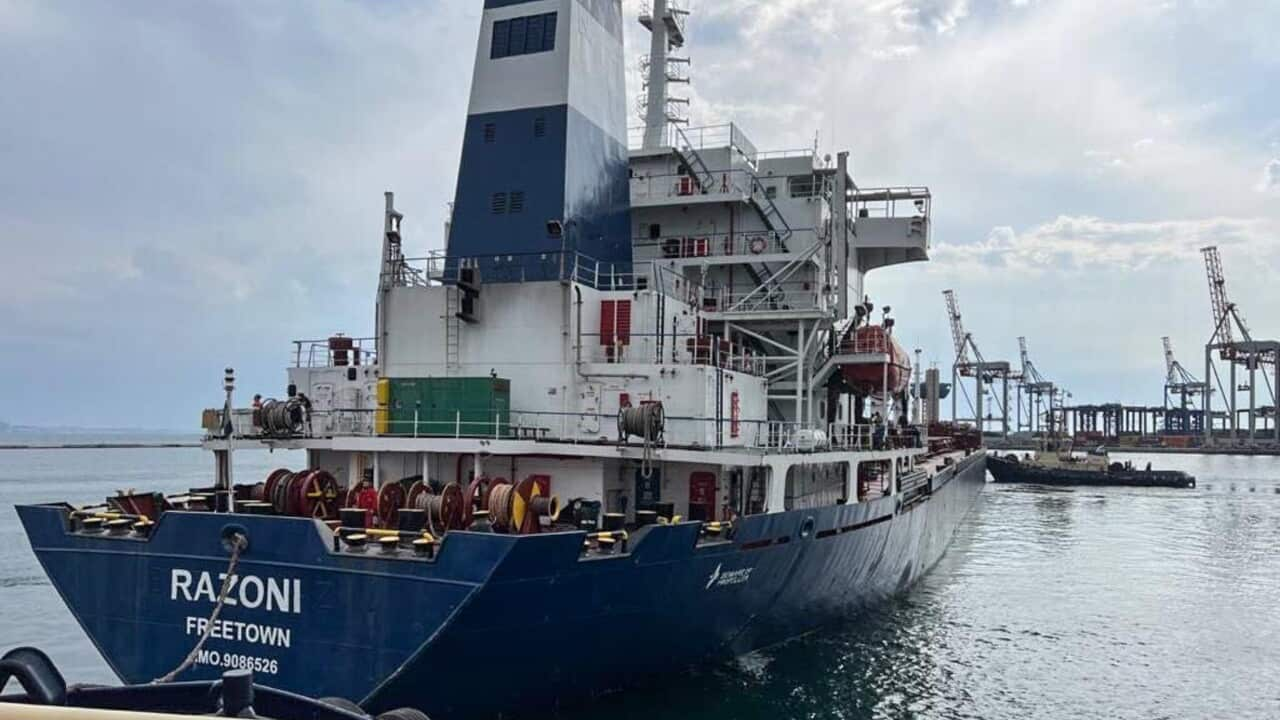In his second address to Australians, Ukrainian President Volodymyr Zelenskyy urged the government and the general public to maintain their support for his country in its fight against Vladimir Putin's invasion.
"We will continually be grateful for your support," he said in a live video address on Wednesday evening at an event hosted by the Australian National University (ANU) in Canberra.
"I know a lot of Australians send financial support, send medical supplies, volunteer in hospitals and are also on frontline.
"I call on you to continue to help Ukraine - including in the classrooms by standing up to the myths... [created by] Russian propaganda machine."
Australia's aid to Ukraine now totals about $390 million, after Prime Minister Anthony Albanese vowed last month to step up sanctions against Russia. He also agreed that Australia would provide Ukraine with an additional 20 more Bushmaster vehicles and drones.
Speaking through a translator, Mr Zelenskyy said the contribution of Australia as a non-NATO nation is highly valued and is very necessary for Ukraine to stand up to Russia.
He said more assistance is needed to combat Russia's information war.

Ukrainian President Volodymyr Zelenskyy addresses students from 20 Australian universities. Credit: Australian National University
"Through your social networks you have the option to tell the truth about what is happening."
Students from 20 Australian universities were invited to ask questions of the Ukrainian leader.
Responding to one question on where he finds the courage and strength to keep fighting in the war, Mr Zelenskyy said he is constantly inspired by people in his country, and those around the world supporting Ukraine.
LISTEN TO

Blast at Russian prisoner of war complex kills at least 50 people
SBS News
30/07/202204:47
"I am inspired by people, I am inspired by our nation - a strong, resilient nation. The people who fight...this belongs to the Ukrainian nation.
"The resilience of our nation does not depend only on the leaders of our country. Everyone in our country is a leader, that is the situation we have [in a time of war]. I am sure we will win this war."
Mr Zelenskyy said the "hardest question" he was asked - by Kyle from Queensland University of Technology - on the possibility of Russian-Ukraine relations returning to good terms after the war.
"No one wants to have anything to do with those people who harmed us. In the future, it will depend on Russia.
"I do not even know if this can happen. Every family has lost something, and will not forget."
The final question came from an ANU student, Olivia, who asked about the importance of.
The Kalush Orchestra raised $1.3 million from selling the Eurovision trophy to help fund the purchase drones for the war effort.
Mr Zelenskyy said the Eurovision win was "victory in all directions" and played an important role in boosting morale and motivation.
"I do think the culture, sport and science have great significance in times of war - even more than in peace time.
"And Eurovision is one of the greatest example of where we support our cultural activists. This is a victory in all directions for us. This is important for us because it is a great battlefield for us [to win across all fronts]."
More than 2,800 watched the live-streamed event on YouTube, with students also logged in via Zoom across 21 universities.

Ukrainian Ambassador to Australia Vasyl Myroshnychenko says he believes the number of students participating in Australia outstrips the numbers of events held in the UK and the US. Credit: Australian National University
The Ukrainian Ambassador to Australia, Vasyl Myroshnychenko, said the interactive event was historic, giving an insight into "how it is to be a leader in times of war".
"Students are so important... I think this has never happened in Australian history. And I think Australia has done much better than other countries in terms of turnout and number of people [participating]. In terms of the numbers, I think Australia has demonstrated that you know how to punch above your weight."
Last month, Mr Albanese and met with Mr Zelenskyy face-to-face. During the 12-hour visit, he also paid his respects at a mass grave where 416 civilians were buried by Russian forces after allegedly being executed.
In March, Mr Zelenskyy addressed the Australian parliament calling for more weapons support. The address to Australia was among his first in a series of direct appeals to parliaments around the world - after the US, UK and Europe.
The UN's High Commissioner for Human Rights has documented more than 5,200 civilian deaths in Ukraine since Russia’s full-scale invasion began on 24 February.










